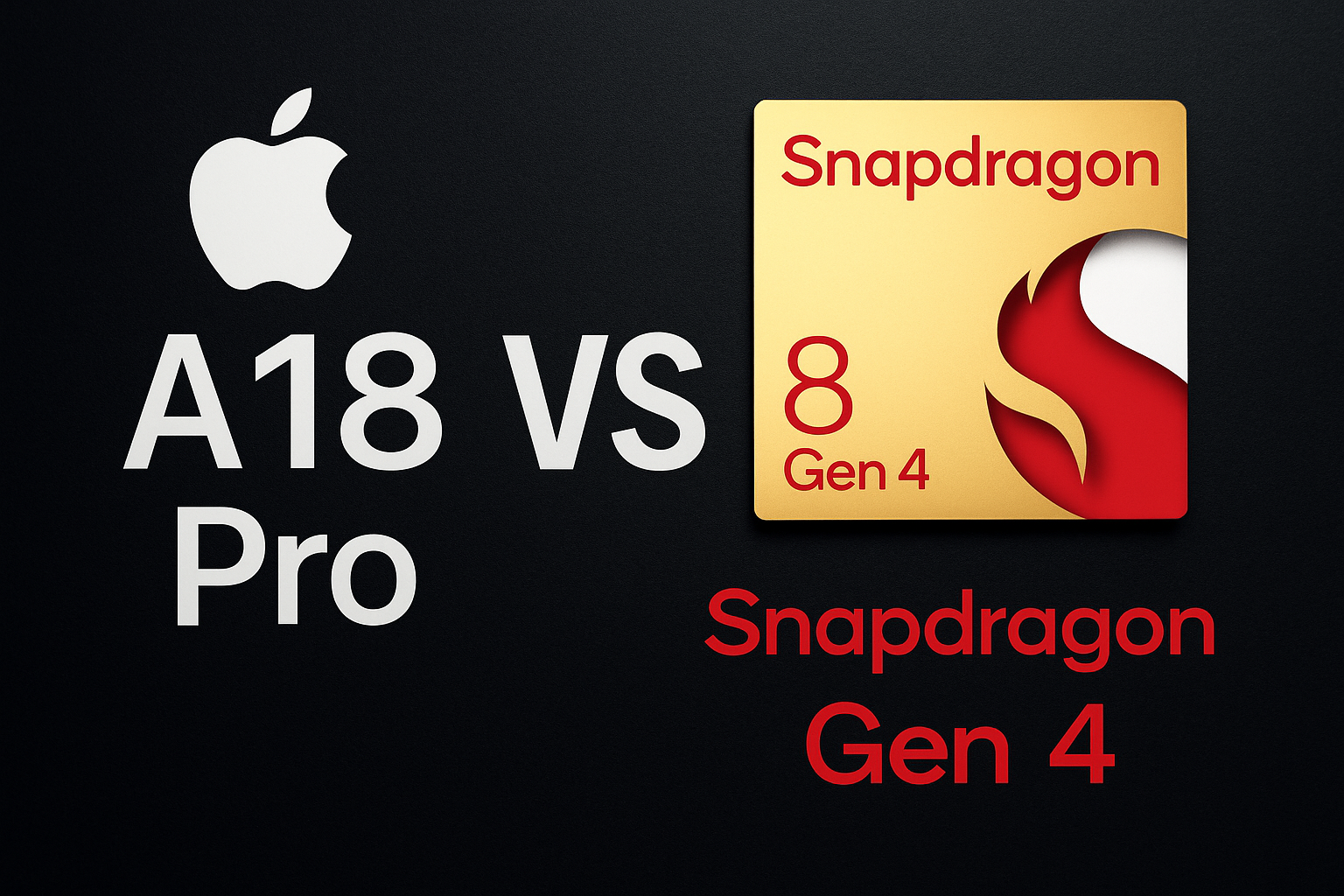
Which is better, A18 Pro or Snapdragon 8 Gen 4? Right at the start, let me tell you: they’re both beastly chips, but each flexes in its own zone. Let’s delve into the details and provide you with a comprehensive understanding.
Background & Release Info
Apple unleashed the A18 Pro in mid-September 2024, built on TSMC’s fancy 3 nm N3E process. It packs a 6‑core CPU (2×4.04 GHz performance + 4×2.42 GHz efficiency), a 6‑core GPU, and a beefy 16‑core Neural Engine doing up to 35 TOPS.
Qualcomm, meanwhile, reshuffled its naming: what used to be called Snapdragon 8 Gen 4 is now marketed as the Snapdragon 8 Elite. But for clarity (and because that’s our focus), I’ll treat them as the same. Its architecture: 2×4.32 GHz + 6×3.53 GHz “Oryon” cores, plus an Adreno 830 GPU, also 3 nm TSMC, launched in October 2024.
Benchmark Showdown
AnTuTu 10:
Snapdragon 8 Elite: ~2.74 million
A18 Pro: ~1.81 million—a whopping 50% lead for Qualcomm.
GeekBench 6 (single-core):
Snapdragon: ~3,155
A18 Pro: ~3,291—Apple edges slightly ahead.
GeekBench 6 (multi-core):
Snapdragon: ~9,489
A18 Pro: ~8,146—about a 16% lead for Qualcomm.
3DMark WildLife & Solar Bay: Snapdragon clocks ~40.7 FPS vs. Apple’s ~30.6 FPS, and much better sustained performance too.
In short, Snapdragon wipes the floor in multi-core, GPU, memory, and overall benchmarks; Apple takes a very narrow lead in single-core.
Real-World Performance
This isn’t just about synthetic scores, though:
CPU grunt: Apple’s compiler optimizations push A18 Pro’s single-core performance and efficiency. NotebookCheck noted Apple’s lead in efficiency, though Snapdragon often surpasses it in multi‑core output.
Gaming & GPU: Adreno 830 offers faster clocks, more VRAM caching, and superior frame-rate stability—ideal for intensive gaming, tracing, and long sessions.
AI & Neural: Both devices, Apple’s 16-core and Snapdragon’s Hexagon with Gen-AI support, boast robust NPUs, resulting in competitive performance, according to Gizmochina.
Efficiency & thermals: Same 3 nm base, but Snapdragon runs a bit warmer under load, and Apple gets slightly better power efficiency in single-core XiaomiToday. Still, differences in daily battery life depend heavily on phone design.
Use-Case Breakdown: Which is better, A18 Pro or Snapdragon 8 Gen 4?
| Use Case | A18 Pro | Snapdragon 8 Gen 4 |
|---|---|---|
| Everyday performance | Smooth UI, excellent single-core speed | Slightly slower, but still slick |
| Gaming & graphics | Great, but less GPU horsepower | Dominates with higher FPS, ray tracing |
| AI tasks | Fast & efficient Apple Neural Engine | Great Gen‑AI performance, Android ecosystem |
| Battery life | Excellent thermal management & efficiency | Slightly higher power draw under stress |
| Ecosystem | Seamless with iOS and Apple hardware/software | Wide Android devices, mod-friendly phones |
What’s New: Snapdragon vs Apple Shake-Up?
Qualcomm is hyping the Snapdragon 8 Elite as “the world’s fastest mobile chip,” calling it a real rival to Apple’s A18 Pro in AI, gaming, and multitasking.
And here’s a curveball from Xiaomi: they recently debuted the XRING 01 chip, claiming it beats both Apple’s A18 Pro and Snapdragon 8 Elite on AnTuTu. It’s definitely worth monitoring.
Final Thoughts
So, which is better, A18 Pro or Snapdragon 8 Gen 4? Depends on where your priorities lie:
Want top single-core speed, a seamless iPhone experience, and optimized power use? Go Apple A18 Pro.
Need raw multi-core performance, a superior GPU for gaming, or love Android’s open ecosystem? Snapdragon 8 Gen 4 (Elite) is your champ.
These are cutting-edge chips that match the performance of a laptop. Do you really need this? Probably not yet—but if you’re pushing the boundaries, they deliver.
Q&A Section
Q1: Will Snapdragon 8 Gen 4 phones beat iPhones in battery life?
Not exactly—Apple’s deep hardware/software integration means the A18 Pro is very efficient in typical use. Snapdragon may use a bit more power under load, but differences depend on actual phone battery, screen, and cooling designs.
Q2: Is the A18 Pro better for AI/generative tasks?
They’re neck-and-neck. Apple’s 16-core Neural Engine is extremely fast, but Snapdragon’s Hexagon NPU with Gen-AI features is likewise powerful. Performance differences are small unless you benchmark.
Q3: Is Snapdragon 8 Gen 4 just rebranded?
Pretty much. Qualcomm’s 2024 flagship is officially named Snapdragon 8 Elite, though many still say Gen 4. Architecture and process remain the same.
Q4: What about Xiaomi XRING 01?
A new wild card—Xiaomi’s 3 nm chip apparently beats both in AnTuTu. We’ll need more independent benchmarks to confirm Cinco Días.
Which is better, A18 Pro or Snapdragon 8 Gen 4?
Both chips are insane—Apple’s A18 Pro offers unmatched efficiency and smoothness in iPhones, while Qualcomm’s Snapdragon 8 Gen 4 (Elite) delivers stronger multi-core and GPU performance for gaming and multitasking. Choose your fighter based on ecosystem and what you care about most.
Also Read: Apple vs Samsung : From First Phone to Flagship – A Legendary Tech Journey
